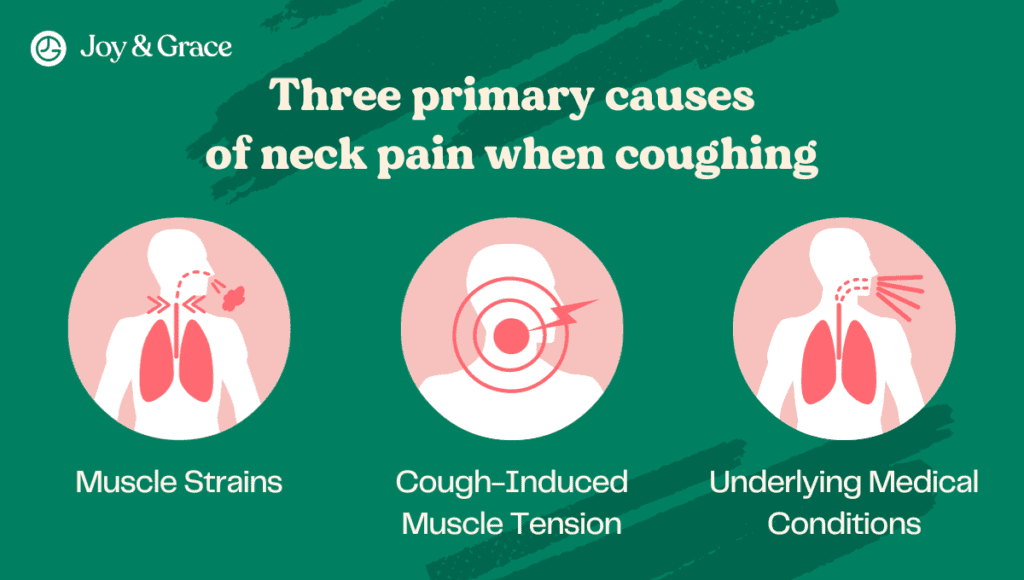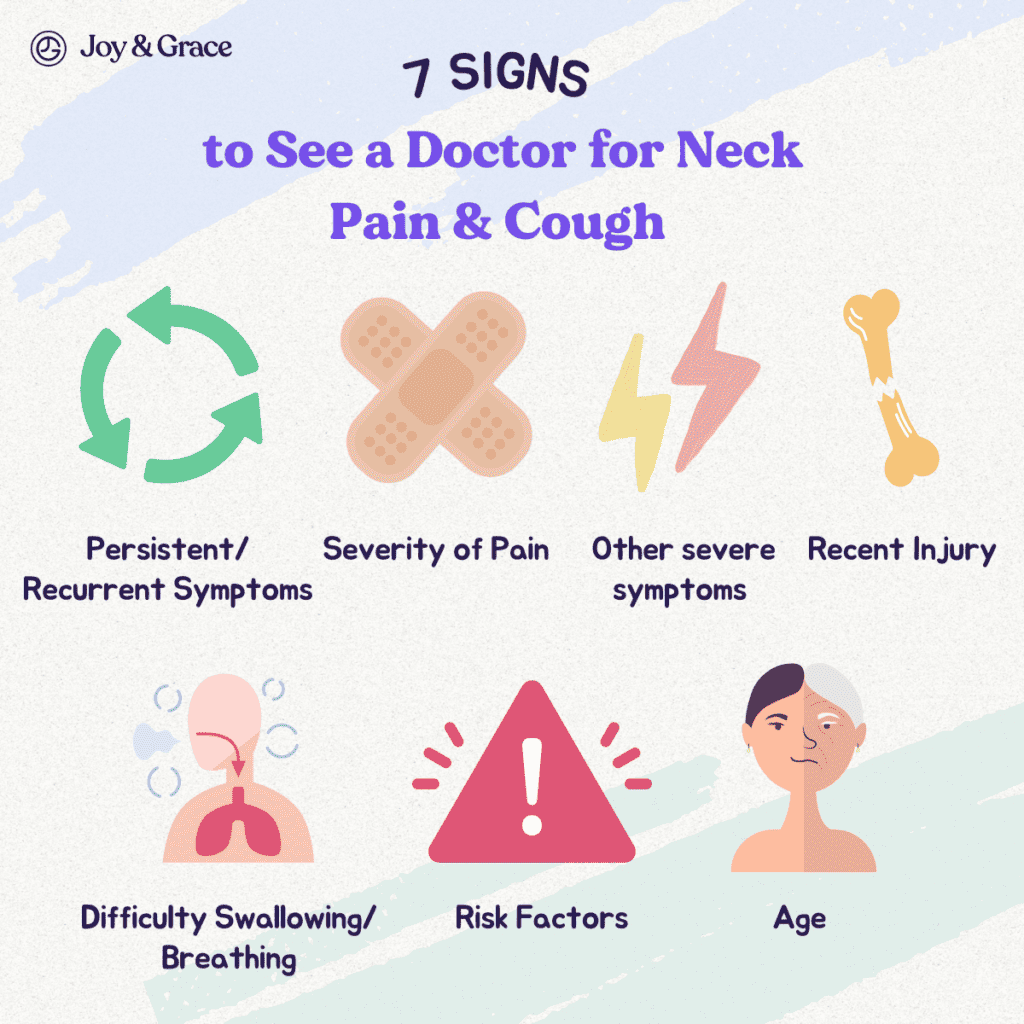When your cough takes an uncomfortable turn, you might wonder, "Can this really cause neck pain?". It's a question that's not only intriguing but also important for understanding how our bodies react to something as common as a cough.
Let's delve into this surprising connection, uncovering its causes and implications.
Can Coughing Cause Neck Pain?
Yes, persistent or severe coughing can potentially lead to neck discomfort in some instances.
Let’s review the most common causes and how they contribute to the pain.
Why Does My Neck Hurt When I Cough?

There are three primary causes of neck pain when coughing:
- Muscle Strains
Muscle strains are the most probable cause of coughing-related neck pain.
The act of coughing causes a sudden, forceful release of air from your lungs. That can sometimes hurt the muscles and soft tissues in your neck and upper back.
A neck muscle prone to injury from excessive coughing is your scalene muscle.
It's important to note that these conditions can be exacerbated if the muscles are already tense or “tired.”
Poor posture, lack of physical activity, or extended periods of sitting can pre-tense the muscles, making them more susceptible to strain from coughing.
- Cough-Induced Muscle Tension
During a coughing episode, you may hunch forward or tense up your neck and shoulders, especially if you’re trying to suppress a cough. This altered posture can lead to neck strain and discomfort.
Like muscle strains, cough-induced muscle tension can be more severe if the muscles are already under stress from factors like bad posture or insufficient activity.
- Underlying Medical Conditions
In some cases, chronic coughing may be a symptom of an underlying health condition, such as acid reflux, asthma, or postnasal drip. These conditions can contribute to throat irritation and frequent coughing, which in turn can lead to neck pain.
How Does Coughing Lead To Neck Pain?
Let’s take a look at how coughing works to answer this question. Coughing is a natural reflex that helps clear your airways and get rid of mucus and irritants. It's like your body's way of cleaning the pipes.
When you cough, your body first closes a part of your throat (the glottis) and increases the pressure inside your chest. Coughing is pretty strong. It can expel air and mucus at over 500 miles per hour! This force can loosen mucus and push it out.
To simplify it: coughing happens in three main phases.
- First, you take a deep breath (inspiration).
- Then, your throat closes, and certain muscles tighten to build up pressure in your chest (compression).
- Finally, your throat quickly opens, and you push out air and mucus (expiration), which can create those coughing sounds.
These processes require the help of the muscles of your neck and chest.
So, when you have neck pain from coughing, it's usually because the muscles in your neck have been working hard to support the forceful and repeated coughing.
Can Coughing Cause Chest And Neck Pain?
Indeed, constant coughing can cause chest and neck pain. A persistent cough can put our upper-body muscles under a lot of strain. Each time we cough, we engage our intercostal muscles between our ribs. When we cough too much, these muscles can get worn out and sore, leading to chest pain.
This can particularly happen if you’re battling a persistent respiratory condition like chronic bronchitis or pneumonia. These conditions can cause frequent, intense bouts of coughing. Even a viral infection like the common cold or flu can lead to a sore neck if we're coughing a lot.
The infection responsible for your cough can also cause pleurisy. Pleurisy, or pleuritis, is characterized by inflammation of the pleura. The pleura is the thin, double-layered membrane that surrounds your lungs and lines your chest cavity. Pleurisy causes chest pain that can travel to your neck and shoulders and is worsened by coughing.
What Are The Symptoms Of Neck Pain Caused By Coughing?
The specific symptoms of neck pain due to excessive coughing vary depending on the exact cause. But in general, you may experience:
- A dull, constant ache in the neck region
- Pain that worsens when you move your neck or cough
- Pain that travels to the base of your skull or your shoulders
- A stiff neck
- A sore throat
In addition to these symptoms, you might also experience:
- Headaches
- Tender or swollen lymph nodes
- Fever
- Fatigue
- Shortness of breath
While these symptoms might not directly indicate neck pain resulting from a cough, they often accompany it.
How Can I Tell If My Neck Pain Is Caused By Coughing Versus Another Condition?

Identifying the cause of your neck pain can be tricky, especially if it coincides with coughing. However, some indicators can help determine whether your neck pain is specifically due to coughing or possibly associated with another condition.
You can usually tell if your neck pain is from coughing if the discomfort occurs only during or immediately after coughing. The neck pain should improve as your cough subsides and your respiratory condition improves.
However, if the neck pain persists even without coughing, it might indicate a more serious condition that needs addressing. Note that although these conditions may cause neck pain without a cough, coughing can worsen the pain.
What Home Remedies Help Relieve Neck Pain From Coughing?
If you're searching for ways to relieve neck pain from coughing, here are some home remedies you might want to consider:
- Heat and Cold Therapy
Applying a warm compress or heating pad to your neck can help relax tightened muscles. Meanwhile, a cold pack can minimize inflammation.
- Gentle Neck Stretches and Exercises
Simple movements like nodding your head can help ease neck tension. Adding some neck exercises can help strengthen the muscles.
- Over-the-Counter Medications
Over-the-counter pain medications may help reduce pain and inflammation.

- Hydration
Staying well-hydrated by drinking plenty of fluids can help keep mucous thin and might reduce the frequency of your coughs. This can indirectly relieve your neck pain.
- Rest
Getting ample rest allows your body to recover from the stress caused by constant coughing.
Remember, if your neck pain remains persistent or is severe, it's advisable to consult with a healthcare professional.
How Can I Prevent Neck Pain When I Have A Cough?
So, the question stands: how can you prevent neck pain from coughing? Well, aside from what we mentioned above, the best way is to treat the cause of your cough. Remember, maintaining hydration and resting adequately during an illness is critical. It minimizes your body's cough reflex, lessening the chance of triggering neck pain.
Also, try slimming down on excessive or forceful coughing. When dealing with a cough, try to suppress it in a healthy, non-invasive manner. You can drink warm water with lemon and honey. This combo can help soothe your irritated throat.
Next, mindful body posture and the right way to cough can alleviate the strain on your neck. Sit up straight while coughing and attempt to do so with your mouth wide open to decrease the strain.
Keeping these points in mind can help curb neck pain due to coughing and offer you a more comfortable recovery.
When Should I See A Doctor For Neck Pain That Occurs With Coughing?

While many cases of neck pain with coughing are not serious, there are situations in which you should seek medical attention. Here are some guidelines to help you determine when to see a doctor for neck pain associated with coughing:
- Persistent or Recurrent Symptoms
- If your neck pain persists or keeps coming back over several weeks or months, it's advisable to consult a healthcare professional.
- Severity of Pain
- If the pain is severe and debilitating, or if it gets progressively worse, this is a concerning sign that warrants prompt medical attention.
- Other Symptoms
- Pay attention to any other symptoms that accompany the neck pain. Watch out for weakness, numbness, tingling, or pain radiating down your arms or legs. These could be signs of a more serious underlying issue and should not be ignored.
- Recent Injury
- Difficulty Swallowing or Breathing
- If you experience difficulty swallowing, breathing, or any changes in your voice, seek immediate medical attention. These could be signs of a serious condition affecting your airway or throat.
- Risk Factors
- You should be more cautious and seek medical advice if you have a medical history of conditions that may weaken your bones or immune system. This can include cancer or autoimmune disorders.
- Age
- Older adults may be more prone to certain neck and spine issues. So, if you’re older, be particularly vigilant about seeking medical attention if you experience neck pain while coughing.
It's essential to consult a healthcare provider when you have concerns about your symptoms. Your doctor can perform a physical examination and order appropriate tests, such as imaging studies and blood tests.
They can give you an accurate diagnosis and recommend an effective treatment plan based on their assessment of your condition.
Uncommon Drama: When Coughing Leads to Serious Pain
Just a heads up before we start discussing: the causes we're diving into next are incredibly rare, so there's no need to worry.
We're mentioning them simply because they exist, and hey, learning something new is always good, right?
If you've been dealing with neck pain that's not too bad, comes and goes, and has been hanging around for a while, it's almost certainly not related to these causes.
These rare cases usually cause pretty severe symptoms right off the bat, sending most people straight to the hospital.
So, let's satisfy our curiosity and learn about them, knowing they're very unlikely to cause your neck pain.
Pneumomediastinum
Did you know that there's something called intrathoracic pressure? It's the pressure inside your chest area. Sometimes, when we cough a lot, this pressure can spike suddenly.
Now, this is super rare, but too much coughing can lead to something called pneumomediastinum.
This happens when the pressure in your chest gets too high.
Pneumomediastinum is where air or gas sneaks into the mediastinum—the space in the middle of your chest between your lungs. Usually, it causes chest pain, but sometimes it takes a trip up to your neck and upper back.
Hematomas
In one case, an 86-year-old man had neck pain, shortness of breath, and difficulty swallowing after a coughing attack.
A hematoma is essentially a collection of blood outside the blood vessels, often caused by an injury or trauma. In this rare case, the older adult's intense coughing led to a hematoma forming in his throat, contributing to his neck pain and other symptoms.
Tracheal rupture
In another case, a 24-year-old man experienced severe neck pain that traveled to his shoulder and back. Upon medical examination, it was discovered that his windpipe (trachea) had ruptured.
A tracheal rupture, a tear or split in the windpipe (trachea), is an unusual and serious condition. It typically occurs due to trauma or medical procedures but can rarely happen spontaneously, as in this case.
Reading about a 24-year-old experiencing a tracheal rupture certainly raises eyebrows, but it's important to put things into perspective. This case stands out precisely because it's so rare. In fact, it's this rarity that made it notable enough to be reported. Fortunately, the patient in question not only healed on his own but also didn't face any complications.
Carotidynia

Neck pain from coughing may also be due to a condition called carotidynia. It’s characterized by pain or tenderness in the neck, specifically along the carotid arteries. The symptoms of carotidynia can be worsened by coughing.
Carotidynia is a very rare disorder.
Takeaway
In a nutshell, while it's not common, coughing can indeed cause neck pain. It’s usually the result of strained muscles or tensing up during a cough. Underlying conditions like acid reflux, asthma, or postnasal drip might also contribute to this issue.
Only rarely is neck pain from coughing the result of serious conditions.
If coughing leads to persistent and severe neck pain, it's crucial to consult a health care provider. Although neck pain from coughing typically resolves once the coughing stops, ongoing discomfort may warrant further medical evaluation.















